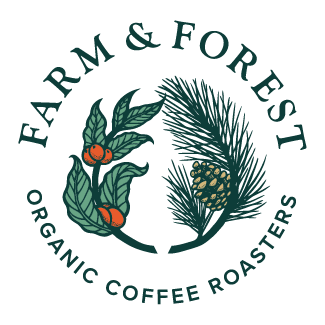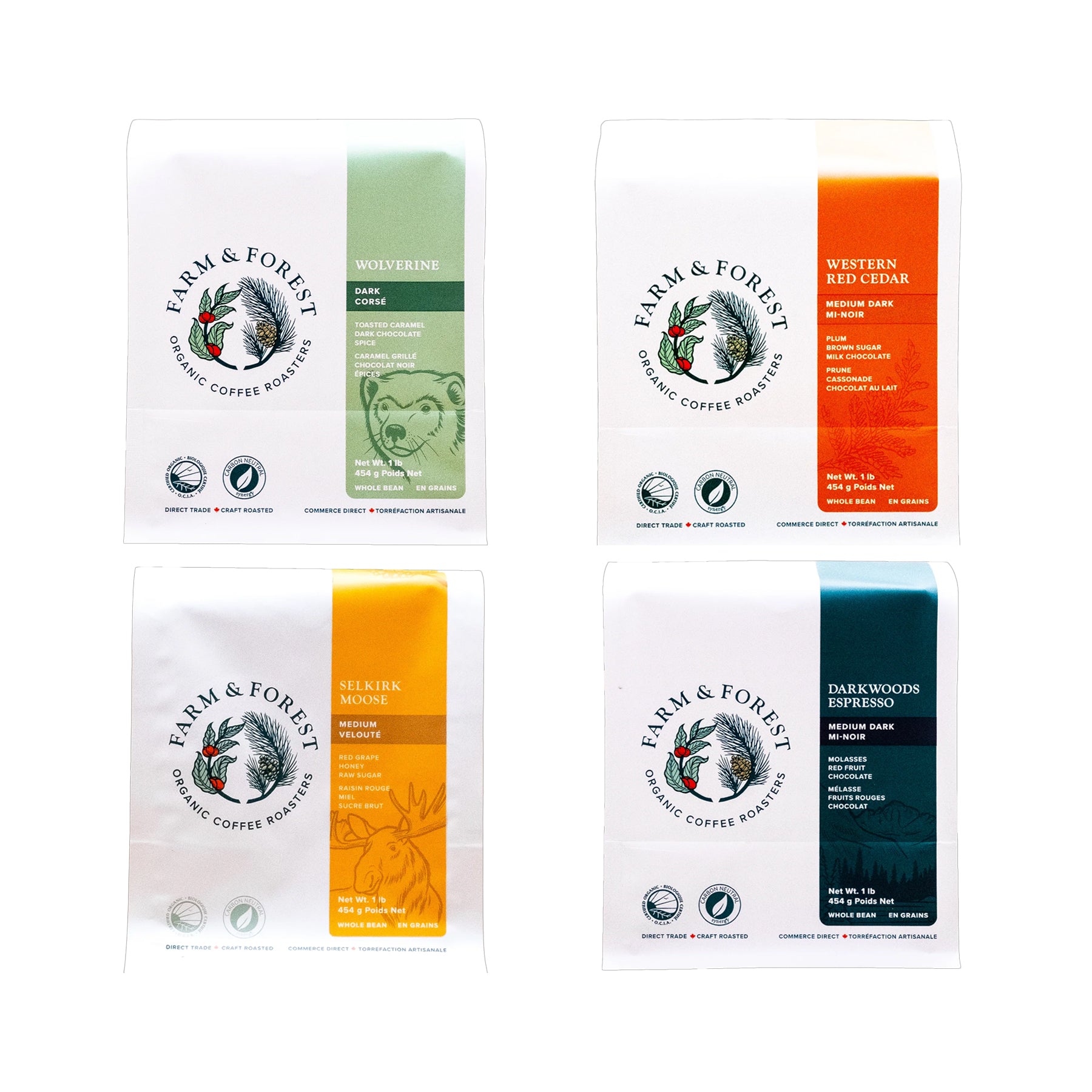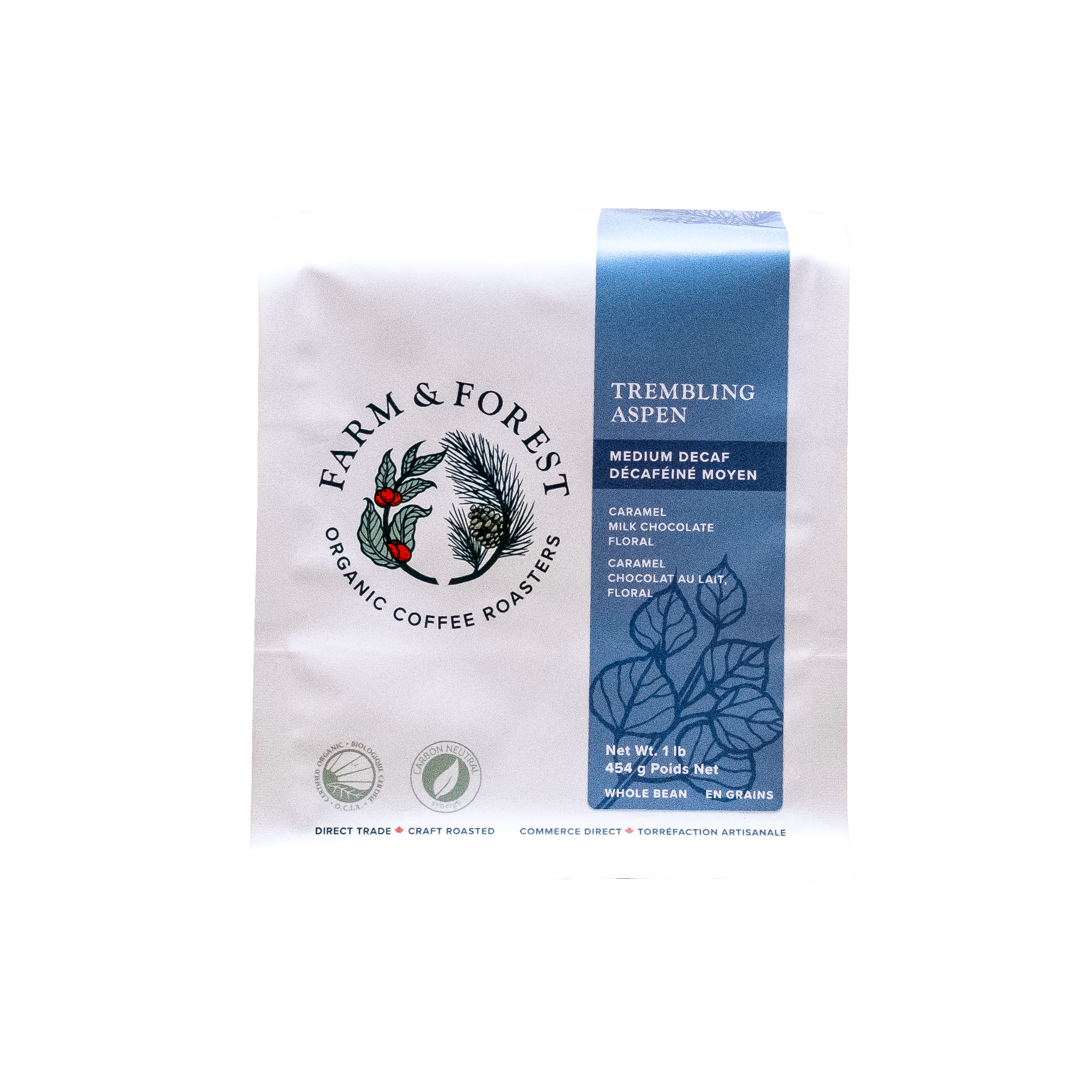Organic Coffee Farm vs Mass Production Coffee Farm. The main differences and impact on coffee flavour
The journey from farm to cup is a complex process that significantly impacts coffee flavour, quality, and environmental footprint. Understanding the distinctions between organic coffee farms and mass-production coffee farms is essential for any coffee aficionado, and in this article we’ll dive into the main differences, highlighting the farming practices, environmental impacts, and the benefits of each approach.
In this article we'll cover:
-
Coffee Farming Practices
-
Coffee Farms Environmental Impact
-
Economic and Social Impacts Of Coffee Farms
-
Coffee Quality and Consumer Preferences
Coffee Farming Practices
Organic Coffee Farms Practices are rooted in sustainable and eco-friendly practices. These farms avoid synthetic chemicals, opting for natural fertilizers and pest control methods. Key practices include:
-
Use of Organic Fertilizers: Organic farms use compost, animal manure, and green manure to enrich the soil. These natural fertilizers improve soil health and promote biodiversity.
-
Shade-Grown Coffee: Many organic farms grow coffee under a canopy of trees. This mimics the natural habitat of coffee plants, reducing the need for chemical inputs and providing a habitat for wildlife.
-
Natural Pest Control: Organic farmers rely on biological pest control methods, such as introducing beneficial insects and birds to manage pests, rather than using synthetic pesticides.
-
Manual Weeding: Instead of chemical herbicides, organic farms often use manual or mechanical methods to control weeds, maintaining soil health and reducing environmental pollution.
Mass Production Coffee Farms Practices, or the practices of the often known as conventional coffee farms, prioritize high yield and efficiency. These farms typically use modern agricultural techniques and synthetic inputs to maximize production. Key practices include:
-
Synthetic Fertilizers: Conventional farms use chemical fertilizers to provide nutrients to the coffee plants quickly. This can lead to higher yields but may deplete soil health over time.
-
Full-Sun Cultivation: Many mass production farms grow coffee in open fields, without shade trees. This practice increases the plant density and yield but can result in habitat loss and higher pest populations.
-
Chemical Pesticides and Herbicides: To control pests and weeds conventional farms often use synthetic chemicals. While effective in the short term, these can lead to soil and water contamination and health risks for farmworkers and consumers.
-
Mechanized Harvesting: Large-scale coffee farms frequently employ machinery for planting, maintaining, and harvesting coffee. This enhances efficiency but can reduce the quality of the coffee beans if not carefully managed.
Coffee Farms Environmental Impact
Organic Coffee Farms present several environmental benefits:
-
Biodiversity Conservation: Shade-grown coffee farms support a diverse ecosystem, providing habitat for birds, insects, and other wildlife.
-
Soil Health: Organic practices enhance soil structure and fertility, reducing erosion and promoting water retention.
-
Reduced Pollution: By avoiding synthetic chemicals, organic farms prevent chemical runoff into water bodies, protecting aquatic ecosystems.
-
Carbon Sequestration: The presence of shade trees in organic farms helps sequester carbon, mitigating climate change.
Mass Production Coffee Farms have a great contribution to meeting the global demand for coffee, but they also pose environmental challenges:
-
Deforestation: Full-sun coffee cultivation often involves clearing forests, leading to habitat loss and decreased biodiversity.
-
Soil Degradation: The continuous use of chemical fertilizers can degrade soil health, making it less fertile over time.
-
Water Pollution: Runoff from chemical inputs can contaminate water sources, affecting both aquatic life and human health.
-
Greenhouse Gas Emissions: The lack of shade trees and the use of machinery contribute to higher greenhouse gas emissions.
Economic and Social Impacts Of Coffee Farms
Organic coffee farming can provide significant economic and social benefits:
-
Improving income: Organic coffee often commands higher prices in the market, providing better income for farmers.
-
Community Health: Reduced exposure to harmful chemicals improves the health and safety of farmworkers and nearby communities.
-
Fair Trade Practices: Many organic farms are part of Fair Trade programs, ensuring fair wages and improved working conditions for farmers.
-
Community building: With better wages and following sustainable best practices the community can have healthier growth while protecting their region’s natural resources, and creating job opportunities in previously marginalized areas.
Mass Production Coffee Farms economic and social aspects:
-
High Yield: Mass production farms can produce large quantities of coffee, meeting the high global demand and providing employment opportunities.
-
Lower Costs: The use of synthetic inputs and mechanization can reduce production costs, making coffee more affordable for consumers.
-
Market Reach: Conventional farms often have better access to international markets, ensuring a stable income for farmers.
Coffee Quality and Consumer Preferences
Organic coffee is associated with higher quality and unique flavours, and here is why:
-
Flavour Profile: Organic coffee beans typically have a richer and more complex flavour due to the diverse growing conditions and natural farming practices.
-
Health Benefits: Organic coffee can have health benefits as it is free from synthetic chemicals, that have been largely researched and show long-term risk to consumers.
-
Ethical Considerations: Many coffee enthusiasts choose organic coffee for its environmental and social benefits, aligning with your values.
Mass Production Coffee, or conventional coffee is widely available and caters to various consumer preferences:
-
Consistency: Mass production methods ensure a consistent flavour, which appeals to many coffee drinkers as it can be a more convenient option. Even as most of the nuances, depth and complexity of the flavours are not present as in organic coffee.
-
Affordability: Conventional coffee is generally more affordable, making it accessible to a broader audience.
Conclusion
Now that you know the main differences between organic and mass-production coffee farms, such as the environmental impact, farming practices, economic benefits, and personal preferences we hope it is easier to choose the best coffee for you.
As advocates for the environment and great flavour in every cup of coffee we encourage you to prioritize sustainability and biodiversity, offering premium quality and ethical benefits.
Organic Coffee vs Mass Production Coffee FAQs
What is organic coffee farming?
Organic coffee farming involves growing coffee without synthetic chemicals, such as pesticides and fertilizers. It relies on natural methods for fertilization, pest control, and weed management. Organic farms often use compost, animal manure, and green manure to enrich the soil, and they may implement shade-grown practices to mimic natural coffee plant habitats and promote biodiversity.
How does mass production coffee farming differ from organic farming?
Mass production coffee farming, also known as conventional farming, prioritizes high yield and efficiency through the use of synthetic fertilizers, pesticides, and mechanization. These farms typically grow coffee in full-sun conditions, which allows for higher plant density but can lead to environmental challenges such as soil degradation, water pollution, and habitat loss. In contrast, organic farming focuses on sustainable practices and environmental conservation.
What are the environmental impacts of organic coffee farming?
Organic coffee farming offers several environmental benefits, including:
-
Biodiversity Conservation: Shade-grown organic farms support diverse ecosystems, providing habitats for wildlife.
-
Soil Health: Organic practices improve soil structure and fertility, reducing erosion and promoting water retention.
-
Reduced Pollution: Avoiding synthetic chemicals prevents chemical runoff into water bodies, protecting aquatic ecosystems.
-
Carbon Sequestration: Shade trees in organic farms help capture carbon, mitigating climate change.
What are the environmental impacts of mass production coffee farming?
Mass production coffee farming can have negative environmental impacts, such as:
-
Deforestation: Clearing forests for full-sun cultivation reduces biodiversity and destroys habitats.
-
Soil Degradation: Continuous use of chemical fertilizers can deplete soil health over time.
-
Water Pollution: Runoff from synthetic chemicals can contaminate water sources, affecting both aquatic life and human health.
-
Greenhouse Gas Emissions: The lack of shade trees and the use of machinery contribute to higher emissions.
How does the quality of organic coffee compare to mass-produced coffee?
Organic coffee is often considered to have a richer and more complex flavor due to the diverse growing conditions and natural farming practices. Many consumers prefer organic coffee for its potential health benefits, as it is free from synthetic chemicals. Additionally, organic coffee is often associated with higher quality and ethical considerations, making it appealing to environmentally and socially conscious consumers.
Is organic coffee more expensive than conventional coffee?
Yes, organic coffee typically commands higher prices in the market. The higher cost is due to the labor-intensive farming practices, the use of natural inputs, and the certification process for organic status. However, many consumers are willing to pay a premium for organic coffee because of its environmental, health, and social benefits.
Bonus: Most people don't realize that some coffes delivered by pods have can cost $88+ per pound, which is 4x the average cost of organic options in the market. So you might be paying more for coffee that won't have the same quality or sustainable impact.
How does shade-grown coffee benefit the environment?
Shade-grown coffee farms benefit the environment by:
-
Supporting Biodiversity: Providing habitats for various species of birds, insects, and other wildlife.
-
Protecting Soil Health: Shade trees help prevent soil erosion and improve soil structure.
-
Enhancing Carbon Sequestration: Trees capture carbon dioxide, helping to mitigate climate change.
-
Reducing Need for Chemicals: The natural canopy can help control pests and diseases, reducing the need for synthetic pesticides.












